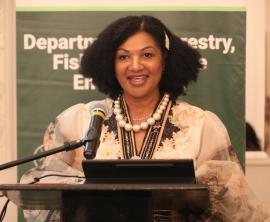By Bernice Swarts
Malibongwe Igama Lamakhosikazi! – Praise the name of women! This rallying cry, echoing from the historic 1956 Women’s March, remains as relevant today as it was when more than 20,000 women stood in defiance of the oppressive pass laws.
Their courage and unity were a turning point in our history, laying the foundations for a non-sexist, non-racial democracy.
But while we rightly honour the women of 1956 every August, I am convinced more than ever that our country cannot afford to limit women’s recognition to a single month. Women’s empowerment is not an event – it is an ongoing process that contributes the hope of our communities. The progress of our country is directly linked to the progress of its women.
Since 1994, our democracy has made important strides in advancing gender equity. Today, women occupy 25.8% of top management positions in the private sector and 43% of seats in Parliament. These achievements are significant, but much more remains to be done to ensure full economic and social emancipation for women in our country.
This year’s Women’s Month theme, “Building Resilient Economies for All,” reminds us that empowering women is not an act of charity – it is the foundation of inclusive growth. President Cyril Ramaphosa expressed it well when he said: “When a woman is empowered – everyone gets empowered. When women prosper, we all prosper. When women rise, we all rise.”
As the Department of Forestry, Fisheries and the Environment, we continue to prioritise women in the employment profile of the department – especially at the most senior levels. We are proud that our department is led by a female Director-General, Ms Nomfundo Tshabalala. Of the 11 Deputy Directors General positions, nine are held by women. There are 204 positions at Senior Management level and 105 are held by women which constitute 51% representation. Our Total Permanent Staff Compliment is 3115 and 1623 are women which constitute 52% representation. It is also worth mentioning that the department has achieved on 2% Government set target for Persons with Disabilities; we have employed 64 persons with disabilities. These figures reflect a deliberate effort to ensure inclusivity and equity within our department.
Beyond the corridors of our offices, we are implementing programmes that continue to open doors for women across communities. Between 2020/21 and 2024/25, the department created 323,462 Expanded Public Works Progarmme (EPWP) work opportunities, surpassing our five-year target. Of these, 56% went to women, 59% to youth, and 1.09% to persons with disabilities. Through the EPWP, we also achieved 95% of our five-year target for Full-Time Equivalents, contributing 140,594 to the total and advancing the goals of the Medium-Term Strategic Framework. Moving forward, we will intensify our focus on prioritising women within EPWP and many of our programmes.
Our department’s efforts to empower women are also reflected in the services we deliver to the public. We are transforming the forestry sector by transferring plantations to communities. Between 2020/21 and 2024/25, we transferred 21 plantations across the country, fostering inclusive economic participation and empowering rural communities – particularly bringing in women to benefit from this programme. The transfer of these plantations to our communities supports the objectives of our Commercial Forestry Masterplan.
Through our Chemicals and Waste Management Branch, we are involving women in initiatives to tackle plastics pollution, e-waste, and hazardous chemicals – this sector remains important in the creation of green jobs and sustainable livelihoods.
But empowerment is not only about jobs and leadership – it is about safety and dignity. South Africa cannot talk about women’s empowerment while Gender-Based Violence and Femicide (GBVF) continue to plague our communities. Government has strengthened the legislative framework with measures such as the Criminal Law (Sexual Offences and Related Matters) Amendment Act, the Domestic Violence Amendment Act, the National Council on GBVF Act, and the NPA Amendment Act.
These laws are crucial, but laws alone will not end GBVF. Every South African – men and women – must actively take part in creating safe communities and ending this national crisis.
As we honour the bravery of the women of 1956, let us recommit ourselves to a future where women and men build together, rise together, and prosper together. Because when women thrive, nations flourish.
*Bernice Swarts is the Deputy Minister of Forestry, Fisheries and the Environment











